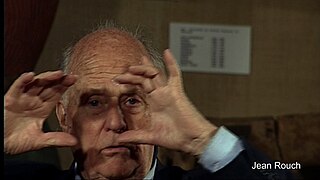Related Research Articles

Benin has played an important role in the African music scene, producing one of the biggest stars to come out of the continent in Angélique Kidjo. Post-independence, the country was home to a vibrant and innovative music scene, where native folk music combined with Ghanaian highlife, French cabaret, American rock, funk and soul, and Congolese rumba. It also has a rich variety of ethnomusicological traditions.

Jean Rouch was a French filmmaker and anthropologist.

Cinema of Africa is both the history and present of the making or screening of films on the African continent, and also refers to the persons involved in this form of audiovisual culture. It dates back to the early 20th century, when film reels were the primary cinematic technology in use. During the colonial era, African life was shown only by the work of white, colonial, Western filmmakers, who depicted Africans in a negative fashion, as exotic "others". As there are more than 50 countries with audiovisual traditions, there is no one single 'African cinema'. Both historically and culturally, there are major regional differences between North African and sub-Saharan cinemas, and between the cinemas of different countries.
Khady Sylla was a Senegalese writer of two novels, short work, and filmmaker.
Oumarou Ganda was a Nigerien director and actor who helped bring African cinema to international attention in the 1960s and 1970s.

The following outline is provided as an overview of and topical guide to Benin:
Paulin Soumanou Vieyra was a Dahomeyan/Senegalese film director and historian. As he lived in Senegal after the age of 10, he is more associated with that nation.

The cinema of Senegal is a relatively small film industry which experienced its prime from the 1960s through to the early 1980s, but has since declined to less than five feature films produced in the last ten years.
Benin, officially the Republic of Benin, is a country in Western Africa. It borders Togo to the west, Nigeria to the east and Burkina Faso and Niger to the north; its short coastline to the south leads to the Bight of Benin. Its size is just over 110000 km2 with a population of almost 8500000. Its capital is the Yoruba founded city of Porto Novo, but the seat of government is the Fon city of Cotonou. About half the population live below the international poverty line of US$1.25 per day.
Monique Mbeka Phoba is a filmmaker whose family comes from the Democratic Republic of the Congo (DRC) but who now lives in Benin. Her films have won a number of awards.

Apolline Traoré is a Burkinabé filmmaker and producer.
Pierre Haffner (1943-2000) was a French film critic, "one of the first French critics to seriously study African film".
The Cinema of Benin refers to the film industry of the Republic of Benin in West Africa.
Faissol Fahad Bolade Gnonlonfin is a Beninese film director and producer.
Christiane Chabi-Kao is a Beninese film director and screenwriter.
N'Diagne Adechoubou is a Beninese film director and producer.
Claude Haffner, is a French-Congolese filmmaker and production manager primarily direct documentary films. She has made several critically acclaimed documentaries including Ko Bongisa Mutu, Défilé Célianthe and Noire ici, blanche là-bas.
Ange-Régis Hounkpatin, is a French–Beninese filmmaker and screenwriter.
Jean-Dominique Burton, born on 13 October 1952 in Huy (Belgium), is a Belgian photographer and filmmaker, author of several books of photographs focusing on Europe, Asia and Africa. Since 1978, numerous exhibitions have been dedicated to his work, in Europe, Africa, North America and Asia. Many of his works have also been included in public and private collections.
References
- 1 2 3 Roy Armes (2008). "De Medeiros, Richard". Dictionary of African Filmmakers. Indiana University Press. p. 56. ISBN 0-253-35116-2.
- 1 2 Angela Martin (1982). African Films, the Context of Production. British Film Institute. p. 50.
- 1 2 FESPACO; L'Association des Trois Mondes (2000). "De Medeiros, Richard". Les cinémas d'Afrique: dictionnaire. KARTHALA Editions. p. 146. ISBN 978-2-84586-060-5.
- ↑ Jonathan Kahana (2016). The Documentary Film Reader: History, Theory, Criticism. Oxford University Press. p. 1341. ISBN 978-0-19-045932-1.
- ↑ Isac A. YAÏ, Entretien avec François Sourou Okioh, Cinéaste béninois : « L’aventure dans ce beau métier continue avec ses joies et ses peines… », Fraternité, 1 October 2020.
- ↑ Pierre Haffner, 'Jean Rouch jugé par six cineastes d'Afrique noire', CinémAction, Vol. 17. pp.62–76.
- ↑ N°86 Richard de Medeiros